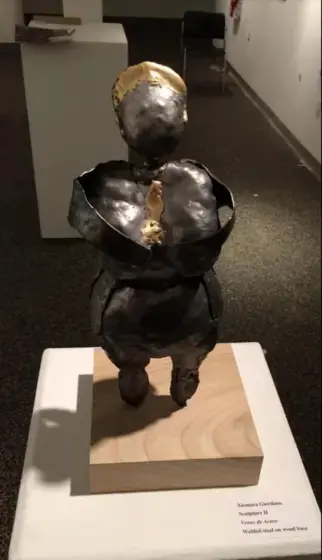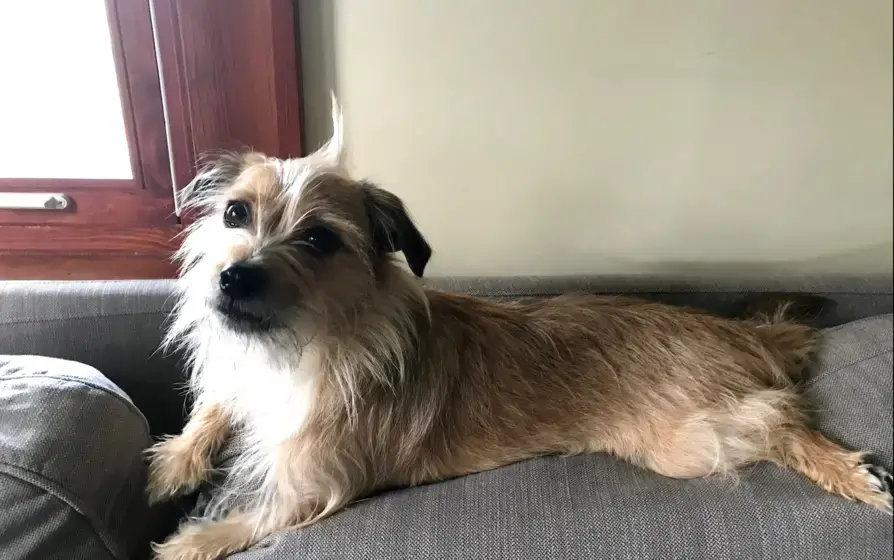A Living Museum
In this Q&A, get to know Xiomara Giordano, Associate Director of the Office of Diversity, Equity, and Inclusion (ODEI).
By Mary Brothers '22
What brought you to Bennington?
I studied at a liberal arts college in Massachusetts for my undergrad. My area of study was Spanish and Portuguese literature, but my minor was studio art. I've always valued creative experiences and the balance of the intellectual as well as the creative and artistic—that's kind of the Bennington thing. You're always using both sides of your brain, which I love.
Once I completed my graduate work, I decided that I wanted to work in a college. I had tried working at larger institutions, and there's just not enough face-to-face contact. I want to get to know people: not only students, but faculty members and my colleagues and other staff members. I found that in Bennington, so when I saw that there was an opportunity to work with study abroad and academic services, I felt like I had a good skill set. I speak several languages. I traveled. I've been a classroom teacher, so I know enough about education and pedagogy. But my scholarship is actually in diversity, equity, inclusion and policy, educational policy. So, while I was happy to come to Bennington, and to work at Bennington—and I've always put that into the work that I do—I ultimately wanted to fold back into DEI and educational policy work.
What most excites you about your new position? What projects are you most looking forward to working on?
My scholarship is in educational policy with a focus on diversity, equity, and inclusion, with the idea of bringing that lens into educational policy. Impacting systems through close introspective and then testing the theories.
I’m a first-generation everything. I'm the only person in my family who has ever done any work that looks like this. So I’m aiming to create space and normalize these kinds of things. There are people who look like me who move through the world who are brown and have tattoos– yet they're also administrators and they do this important work.
One of the biggest projects is working towards community healing. Everything that I'm working on is trying to move in that direction.
Specific projects include developing a speaker series to bring people to campus, in coordination with the President's Working Group and the President's antiracism initiative. The Office of Diversity, Equity, and Inclusion wants to make sure we are representing who’s on the campus and bringing in voices that represent who's on the campus.



What do you think is one of the biggest challenges regarding diversity and inclusion that institutions, particularly colleges and universities, are facing today?
One of the hardest things for Offices of Diversity, Equity and Inclusion is that this work impacts every sector of the college– yet they're usually composed of a staff of one or two people. How can you be in all the meetings? How can you be sitting with everybody and training everybody?
Adding a staff member to this office has helped with that in some ways. It helps to bifurcate the work so Alfredo can focus on more upper-level administration, and I can be physically present and available for students, staff, or faculty, while also doing background work to push initiatives forward.
What has been your favorite thing about working with Bennington students so far?
It’s never the same student twice! Even if it is physically the same student coming into my office, they come in every single time with new ideas, new thoughts, and a new plan.
Bennington students make me feel incredibly hopeful about the world that I'm going to age in. I grew up a weird kid. I was a little maudlin, and artsy, and reading books that were way above what I should have been reading. Being at Bennington lets me see how normal that was.
My queerness in the world is resonant in this space. To me, it's beautiful. I was in a meeting yesterday to interview a candidate, and they asked. “What is your favorite thing about Bennington?” And I said, “It's like a living museum.” You’re surrounded by art and music and thinking, and that's all owed to the students. Students are passionate and they don't hold back. They say the things that they need to say.
What do you like to do in your free time?
I spend a lot of time with my pets. I have two dogs and a cat. We have a small hobby farm. We live on five acres in New York State and love to walk around on the property. We raise chickens for eggs and hang out with the chickens.
I am also an artist and a sculptor, and I sculpt in all mediums. I do fiber art. I create mixed media that are paintings and art and fiber. I'm also an awesome baker. I love to cook and I bake. I love making fancy pieces from scratch because why not?



Are you reading anything good right now?
Because of my new position, I have begun to go through my graduate books again. A really good new book that I got is called My Grandmother's Hands by Resmaa Menakem. It's about using somatic practice to heal racial trauma, which is something that I'm interested in: this idea that we don't just carry pain and sadness in our minds. We carry it in our bodies, and if we don't address both, then pain lingers. With this idea of creating community healing, it's important for me to see what other theorists and people are saying and doing about creating spaces for that.
Is there anything you’d like to say to students regarding your new position?
I'm really excited to make the Office of Diversity, Equity, and Inclusion more available for students. Students who worked with me in Academic Services know that I have an open-door policy. They can always come and let me know what they need. I work for Bennington, so I work for the students.
I've had these conversations with students when we're talking about something like registration and I'm like, “Look, in a perfect world, where nothing else was wrong, just being in college is rough. Right?”
As a college student, all of a sudden, the family, surroundings, and resources that used to be present and available for you are not so available, and you're expected to navigate these changes on your own. Some international students, especially, are moving through complex challenges like insurance issues and billing issues without family support.
On top of the expected challenges of college, add a global pandemic, where now you are worried about your family and your safety. And then—on top of that!—add the layer of stress that has been on campus because of the disconnect, the actual human disconnect, that has happened because of the pandemic.
I have so much respect for what each of you do, and how you show up and show out and create. It's phenomenal to me. I appreciate you all.


